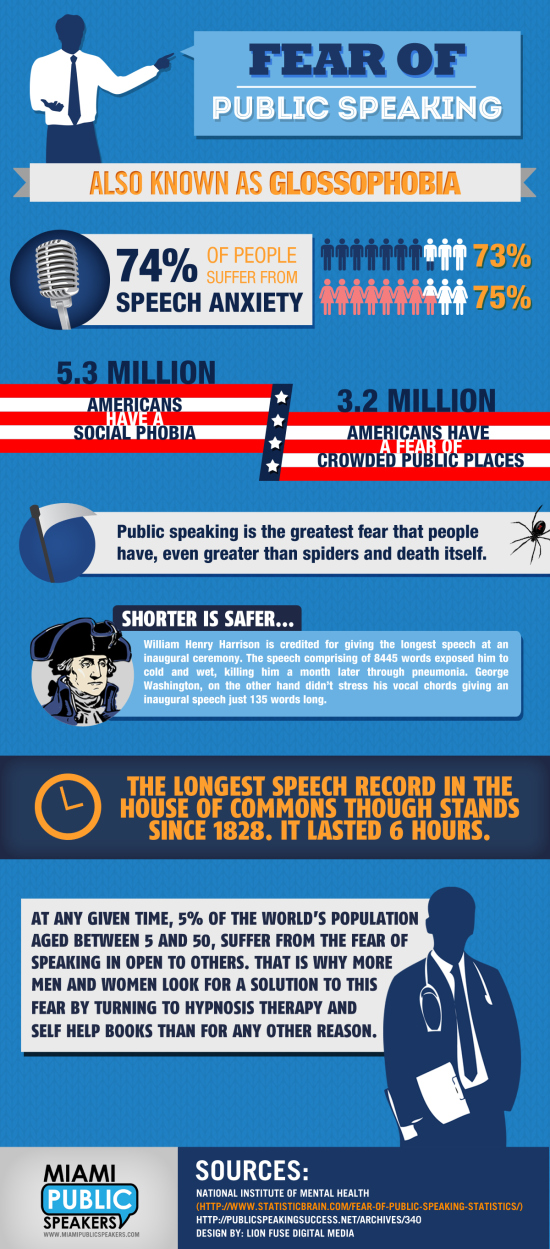Fear of Public Speaking – Can Speech Therapy Really Help?

Image Courtesy of bestpublicspeaker.com
It is the number one fear, ranking above spiders and even death. Glossophobia, or the fear of public speaking, affects as many as 75% of the population to some degree. Sometimes also referred to as stage fright, this condition can leave people trembling, sweating profusely, with difficulty breathing, and stumbling through their words. While there are many different treatment options, including behavior therapies and hypnosis, people are also finding relief through various forms of speech therapy.
Speech Therapy for Public Speaking Wellness
Sure – you go to your doctor when you are feeling very ill, but you also see your doctor for wellness visits. You have your blood tested, your lifestyle discussed, and you perhaps receive a few instructions and tips on how to improve and maintain a healthy life. Speech language pathologists can work with individuals to build better communication skills that can help reduce public speaking anxiety. For those who already experience some form of speech disorder, such as stuttering, public speaking can be even more anxiety-ridden, but SLPs have various methods to treat those issues. Some even SLPs specialize and work as corporate SLPs – targeting their skills and education to help those people in the workforce whose public speaking skills need improvement.
Some of the communication aspects that SLPs can address in regards to public speaking include:
- Accent modification – This is particularly growing in popularity with increases in international business.
- Presentation skills – These can range from learning better breathing and swallowing techniques to calm anxiety as well as incorporating body language effectively.
- Listening skills – Speech therapy is not just about the sounds that a person makes, but it includes the sounds that they hear and can process. Public speaking involves listening to the audience and using your voice to effectively respond.
- Public speaking – Have you ever been to an event where you just couldn’t hear or quite understand the speaker? Speech therapy can provide tools to people who struggle with articulation under stress, vocal tone, and facial muscle coordination that can improve speech quality.
- Vocal health – Especially for those people who do a lot of public speaking, vocal health issues such as hoarseness can become a problem. SLPs can work with individuals to provide them tools for better vocal health, including proper hydration and reduced straining of the vocal cords.
If you experience anxiety at the mere thought of giving a speech in front of just a dozen people, you are not alone. However, there are the above steps you can take with the help of an SLP, along with other tips you can use to make this a less frightening experience.
- Prepare notes or the entire speech. Make the print large enough so that you aren’t squinting, and number your note cards.
- Pick focal points in the room to look up towards that make it appear that you are making eye contact, or even just look at the tops of the audience members’ heads.
- Practice, but don’t go overboard. Sometimes if you try to memorize the entire speech and you miss just one word, it can be more difficult to resume your speech because you are relying too heavily on the precise words and not the overall meaning.
Public Speaking
- http://www.asha.org/Publications/leader/2006/060117/f060117b/
- http://www.psychologytoday.com/blog/science-and-sensibility/201202/stop-procrastinating-and-overcome-your-public-speaking-anxieties
- http://www.publicspeakinginternational.com/blog/?Tag=stage%20fright
- http://www.samharris.org/blog/item/the-silent-crowd-overcoming-your-fear-of-public-speaking
- http://blog.naturaltherapyforall.com/2012/03/22/born-to-speak-understanding-public-speaking-anxiety-and-overcoming-it/
- http://blog.speechtherapycork.ie/?category_name=speech-and-language-therapy





Having overcome a speech impediment, I can/do relate to this fear of public speaking. Ironically, though, my profession often puts me in front of groups of people, and I LOVE it…more that I fear the public speaking…because I have a message to tell my groups.
If I may, I would like to add one more to the list of how to overcome this fear:
get used to talking in front of a small group (it can be your friends) , then gradually expose yourself to larger groups of people.